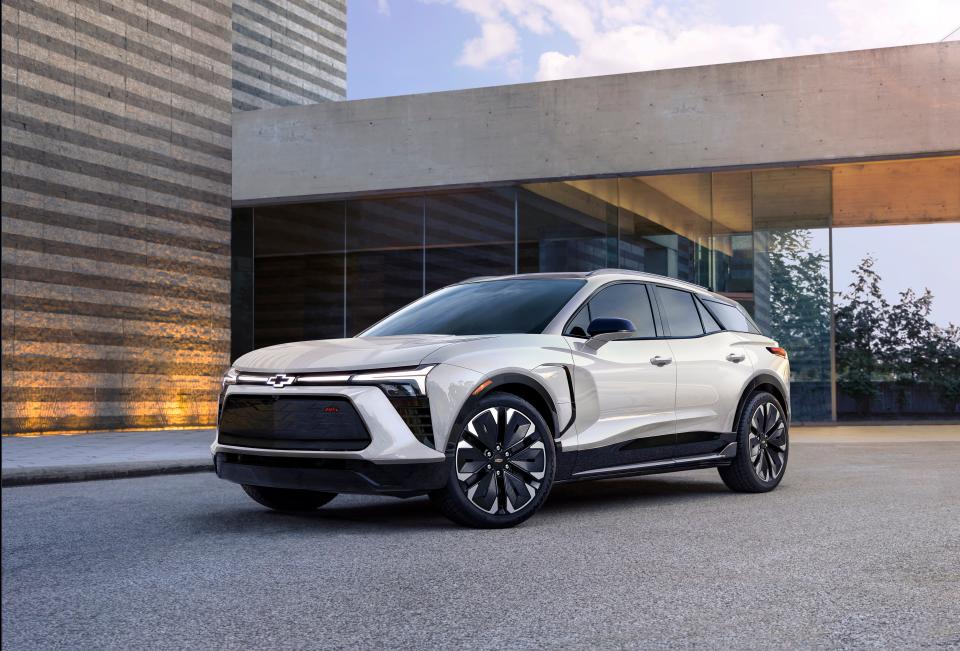Vehicle sticker prices likely to increase in 2024, but deals still possible to find
The deals will be there, but car buyers will have to work this year to find them.
That's the initial impression of some analysts to car buying in 2024. All signs point to it being the best year to buy a car since pre-COVID-19, but experts warn that automakers across the board will likely raise their manufacturer's suggested retail prices (MSRP).
"Because of inflation and the higher costs of producing cars, the UAW contract — which will bleed over to the nonunion automakers too, who have to raise wages or risk their workforce going union as well — you put that together in what is still a market that has not caught up in supply to meet demand, and I can see MSRPs increasing in the same pattern as it did last year," Karl Brauer, executive analyst at iSeeCars.com in Los Angeles, told the Detroit Free Press.

Last year, the average MSRP in January was $41,710, Brauer said. By year-end, it was $43,296, a $1,586 jump across 12 months.
But it's not all bad news, he said. It's a unique market where all players could win.
“For manufacturers, they’ll sell the cars for more to the dealers," Brauer said. But the dealers will have to haggle a lower price. That's because inventory, albeit still shy of demand, is far better than it was even a year ago. Cox Automotive said it is up 51% or by 900,000 this month compared with the year-ago period.
"The dealers will be fine because even if they drop their list prices, their volume of sales will go up,” Brauer said. “For consumers, it means you now have options. You didn’t have any options in 2021 to find a good deal on a car. Everything was expensive. Now if you’re willing to do your research and look at the cars that are off the crazy supply backlog and find the deals … there will be deals.”
High EV prices and UAW contract
Another factor that will drive up average MSRPs this year will be electric vehicles, which continue to remain more costly than gasoline-powered cars.
"Just the EVs alone coming out this year — the actual prices compared with what we were told they’d cost two or three years ago — is another factor to cause an increase in the average MSRP," Brauer said. "I can think of five reasons for MSRPs to go up and not one for them to go down."

There are about 70 new EVs coming to market over the next two years, according to Cox Automotive data.
An example of the higher-than-expected pricing of an EV would General Motors' Chevrolet Blazer EV. When it was first introduced in July 2022, GM said it would start at $44,995. When GM started shipping the Blazer EV this past July, its lowest trim level started at $56,715. Last week, Ford Motor Co. made a series of price changes to its all-electric F-150 Lightning pickups, with some trims seeing a price increase and some getting cuts.

The new contract between the United Auto Workers and the Detroit carmakers grants 25% in base wage increases through April 2028, and it will cumulatively raise the top wage by 33%, compounded with estimated cost-of-living adjustments, to over $42 an hour.
GM CEO Mary Barra said the new contract will add about $500 in cost to GM per vehicle in 2024 and about $575 per vehicle on average over the life of the contract. It will increase GM’s EV battery cell cost by about $3 per kilowatt hour, too, she said. But Barra did not address what that might do to sticker prices.
Ford said the cost effect of the UAW contract by 2028 will be about $900 per vehicle, which Ford will work to offset through higher productivity and lower expenses. Stellantis has not yet released figures related to the contract cost.
Automakers can't pass on all costs to consumers
Cox Automotive Chief Economist Jonathan Smoke said the higher labor costs will "contribute to ongoing inflation in vehicle prices. Consumers will bear some of the cost burden over time but given that affordability is already a challenge for the market, the automakers will not have an easy time passing along all of the costs to buyers and will have to seek efficiencies in other ways, or further limit production to more expensive vehicles that can absorb higher labor costs."

Meanwhile, the Federal Reserve has said it intends to reduce rates in 2024.
“As those come down, we’ll see a mirrored rate drop for car loans,” Brauer said.
Interest rates peaked last fall, Smoke said. For the year, the average interest rate for a new car loan in 2023 was 9.2% and for a used car it was a whopping 13.8%.
Targeted discounts to move metal
According to the Deloitte 2024 Automotive Consumer Study, which quizzed 27,000 consumers across 26 countries in October with about 1,000 of them in the United States, affordability remains a key issue with consumers. The study, released Tuesday, showed 59% of U.S. consumers surveyed put price as the top consideration when selecting a vehicle brand.
“We asked consumers what do you expect to pay for a monthly payment," said Ryan Robinson, automotive research lead for Deloitte. "About 84% in the U.S. said less than $600 a month. When we consider average is $730 to $750, there’s a Grand Canyon opening up between consumer expectations and the sticker shock of what they actually are asked to pay."
Brauer said there is still a backlog of consumers willing to pay the higher prices for a new car. But many consumers can expect more incentives from the automakers on certain models this year compared with previous years, said Cox Automotive Senior Economist Charlie Chesbrough during a news media call Monday.
“I would expect incentives to continue to rise through the course of the year, but I do expect them to be more targeted. On pickups, it will be cash on the hood, particularly from Stellantis,” Chesbrough said. Stellantis makes the Ram full-size pickup. “With EVs, the main focus is going to be leases, especially for people who are tepid about making the big leap to purchase the vehicle. Leasing is the option … and it provides the $7,500 tax incentive.”
Those incentives stem from the better inventory, though some brands have more inventory available than others. Toyota, for example, has the lowest supply of new vehicles and Lincoln the highest, he said.
Customers hold the power to switch brands
Expect used car prices to come down slightly, Brauer said. From October 2022 through October 2023, the average dealer list price for a used car dropped by 5.1%. He expects about the same decline this year. The used car supply remains low, though it could get a spring bounce as trade-in numbers rise. But more people have been buying out their leases because a new car is too expensive, keeping supplies tight, he said.
"Then you have people who are just keeping their cars because they don’t want to pay the used car prices," Brauer said. "So now older model used-car supply will drop because of less trade-ins. So supply remains behind demand."
Still the consumer holds the power. The Deloitte study showed about four in 10 surveyed intend to leave their current brand. They listed a desire to try something different, affordability and access to the latest features as reasons.
More: Ford, Toyota, Kia snag North American vehicle of the year awards
"It’s an exciting time for consumers considering the plethora of options open to them,” said Masa Hasegawa, principal of Global Automotive, and Strategy and Operations Practice at Deloitte. “Almost half of respondents said they are open to switching brands.”
Contact Jamie L. LaReau: jlareau@freepress.com. Follow her on Twitter @jlareauan. Read more on General Motors and sign up for our autos newsletter. Become a subscriber.
This article originally appeared on Detroit Free Press: Car prices likely to increase in 2024, but deals still possible